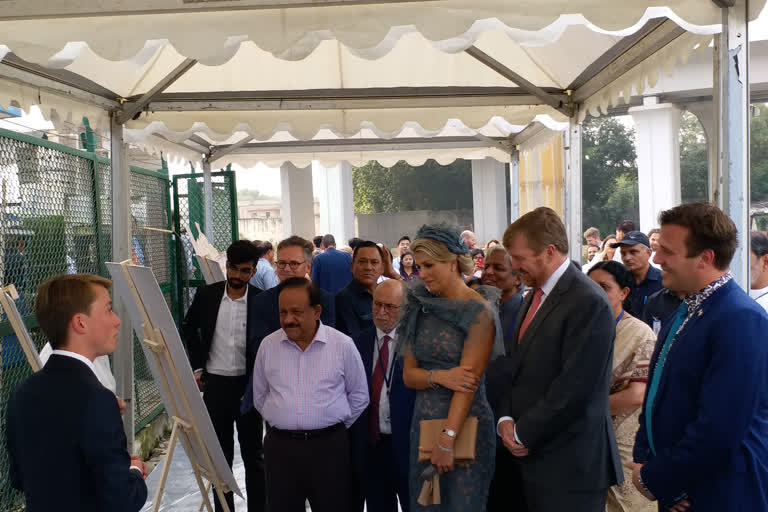New Delhi: The second phase of an Indo-Dutch project that seeks to treat dirty water of Barapullah Drain before it deposits into the Yamuna was launched here on Monday in the presence of Netherlands King Willem-Alexander and Queen Maxima.
The Royal couple, who arrived in New Delhi on Sunday night, visited the water treatment laboratory in the afternoon and also interacted with some of the researchers working on the project.
King Willem-Alexander on his first state visit to India, following his ascension to the throne in 2013, described the project as "wonderful" and "great cooperation".
The Local Treatment of Urban Sewage Streams for Healthy Reuse (LOTUS-HR) project was set up in 2017 at the Sun Dial Park here as part of a collaboration between the governments of India and the Netherlands.
The project is jointly supported by the Department of Biotechnology of the Indian government's Ministry of Science and Technology and Netherlands Organisation for Scientific Research/STW of the government of the Netherlands, according to the ministry.
IIT-Delhi and city-based The Energy and Resources Institute (TERI) are partners in this project, officials said.
"The project is a partnership between the Department of Biotechnology and its counterpart in the Netherlands. And, today we are blessed to have the Dutch Royal couple present here during the launch of the second phase," Union minister Harsh Vardhan said.
Vardhan, who holds the portfolio of science and technology, told reporters that in the second phase, "the plan is to scale up water treatment capacity from 100 litre/day to 10,000 l/day".
"The technology being used is called 'wetland technique' and, we hope that in a couple of years, through this project this area will drastically transform from drainage area to a pleasant garden-like site," he said.
The King in a grey suit and the Queen in a resplendent dress with matching headgear earlier arrived at the laboratory site to a warm welcome, and were received by Vardhan in the presence of Lieutenant Governor of Delhi Anil Baijal; Principal Scientific Advisor to government of India, Vijay Raghavan; and Secretary of the Department of Biotechnology Renu Swarup.
The royals were given a tour of the laboratory and both of them interacted with researchers and sought to know greater details about the project.
Before departing, the King and Queen expressed their appreciation about the project to Vardhan and others, and said, "This is a wonderful project and great cooperation between the two countries".
The couple also posed for pictures for the photojournalists before departing.
Earlier in the day, Prime Minister Narendra Modi held talks with King Willem-Alexander and Queen Maxima with a focus on enhancing bilateral, cultural, and economic ties between the two countries.
The royal couple arrived accompanied by a large delegation of ministers, officials, and top Dutch business honchos.
King Willem-Alexander and Queen Maxima are visiting India at the invitation of President Ram Nath Kovind, according to the Ministry of External Affairs (MEA).
The King and Queen will visit Delhi, Mumbai, and Kerala during their five-day state visit.
Project Director Theo den Bieman, said, "Though this project is about cleaning the Barapullah drain, it also will contribute towards a cleaner city and a cleaner Yamuna".
Rishabh Shukla, a PhD student at IIT-Delhi, who presented his project to the King and Queen, said, "My project is Hybrid Anaerobic Reactor, and the idea is that these bacteria not only eat away the pollutants but also generate methane gas which can be used later. The King asked me, how I could use it for better treatment of the Barapullah drain. It was great to have the royal couple visiting the site".
The project aims to demonstrate a novel, holistic wastewater management approach that will produce clean water which can be reused for various purposes, the science and technology ministry said.
"The innovative pilot-scale modular plant upon commissioning will treat 10,000-liter sewage water per day and will showcase a self-sustaining model for the end-user.
"This pilot-scale facility will employ multiple technologies so that the data. generated at the pilot-scale becomes a tool-box of treatment technologies for replication at other sites in Delhi as well as other parts of India where similar drains exist," it said.
Also read: India, Kazakhstan share military experience to tackle terrorism



